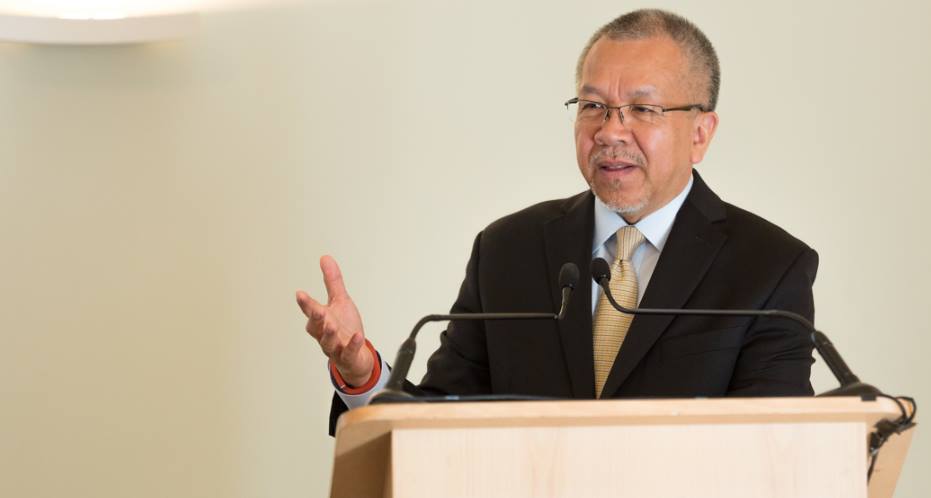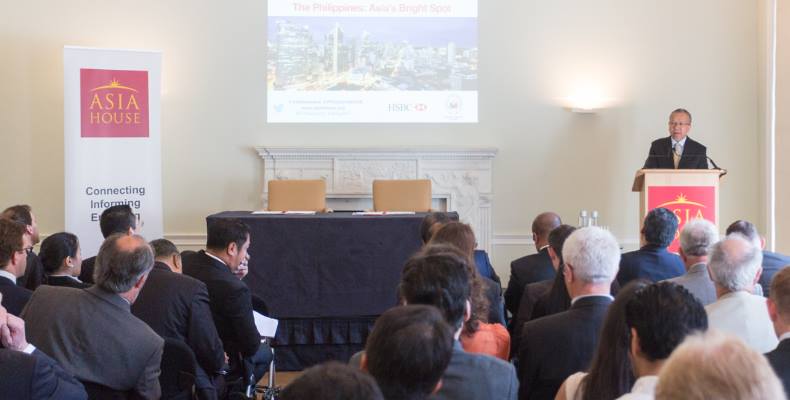Driving commercial and political engagement between Asia, the Middle East and Europe
Driving commercial and political engagement between Asia, the Middle East and Europe
Driving commercial and political engagement between Asia, the Middle East and Europe

The Philippines has a bright economic future with the prospect of strong growth for decades to come, the country’s Trade and Industry Secretary Gregory L. Domingo told business leaders.
Delivering the keynote address at an Asia House business conference entitled The Philippines: Asia’s Bright Spot, Mr Domingo said wide-ranging economic reforms had turned the Philippines into an attractive destination for international investment.
Its workers were young, well-educated and talented, global competitiveness was rising dramatically and the ASEAN member was improving quickly in international measures of governance, transparency, corruption and ease of doing business.
“Our material and human resource endowment plus our strategic location makes us an ideal gateway to the ASEAN market of 600 million people,” he told delegates at the conference.
The country is shedding its reputation for bureaucracy and red tape, graft and the unwelcome tag of “Sick Man of Asia”.
“This accomplishment was not by chance but due to hard work and unity of purpose due to better governance, good fiscal responsibility and really being more business friendly,” Mr Domingo said.
Growth in the Philippines has averaged 6.3 per cent over the past five years and it was Asia’s second fastest expanding economy after China in 2014. Philippine economic growth slipped to 5.2 per cent in the first quarter of 2015 but is forecast to bounce back to between 7 and 8 per cent over the full year.
Mr Domingo said the Philippines’ biggest asset was its young workforce. The median age of its 100-million population is 23, offering the prospect of a huge new generation of educated consumers.
“This young population will enter the labour force and result in lots of consumer spending. We are already seeing early signs of this in the purchases of motor bikes, housing and cars,” Mr Domingo said.
Low wage inflation averaging less than 2.5 per cent between 2009 and 2013 – compared with 14.5 percent in China – has helped the Philippines dramatically improve its global competitiveness. Regional wage boards made up of labour, business and government representatives have played a crucial role in keeping earnings under check.
The economy is also diversifying. There is less reliance in the manufacturing sector on the electronic parts industry and growing competence in other areas such as jetliner maintenance, the supply of aerospace and auto parts, medical devices, printers and steel infrastructure.
The Philippines’ business outsourcing industry was the second biggest in the world behind India and growing strongly.
“Now is the time to do business in and with the Philippines,” Mr Domingo said.
Mr Domingo said positive developments in the Philippines’ economic and business landscape had been acknowledged by the rest of the world.
Over the past four to five years, the country had risen 53 places in the World Bank/International Finance Corporation’s Ease of Doing Business rankings, 33 notches in the World Economic Forum’s Global Competitiveness Report, 49 rungs in Transparency International’s Corruption Perception Index and 39 places in Heritage Foundation’s Economic Freedom Index.
Major credit ratings agencies have also given the Philippines investment grade status.
“There has never been a better time to invest in the Philippines,” Mr Domingo said.
He added that the government was continuing to institutionalise economic reforms under President Benigno Aquino, who has pursued a programme of economic liberalisation since his election in 2010. He is barred under current law from seeking re-election when his term expires next year.
Mr Domingo said the Philippines has eliminated restrictions on foreign ownership of banks, simplified bureaucracy for setting up businesses and clamped down on monopolies and unfair competition.
Now it was opening up local construction industries to overseas competition and liberalising port regulations to ease congestion.
He said the economy still faced challenges from the acceleration of urbanisation and the need for greater broadband capacity.
But as of this year, the Philippines had gained access to the European Union Generalised System of Preferences which opened up market opportunities.
“This can be particularly advantageous for ventures in the area of design-driven products, including clothing, fashion accessories and housewares. Investments in agro-industry, particularly in the manufacture of private label products, are also quite promising,” Mr Domingo said.
“The future looks very bright for the Philippines. The reality will be very different from what your impressions might have been,” he told delegates.

Mr Domingo addresses the audience at Asia House. Copyright Andy Tyler Photography
Other participants echoed Mr Domingo’s assessment of Philippine prospects.
Jeremy Kelly, Global Research Director at leading real estate company JLL (previously Jones Lang LaSalle), said Manila had jumped into JLL’s top 30 list of commercially attractive cities around the world, up from number 37 last year.
The greater Manila area accounts for 55 per cent of Philippine GDP, according to data by HSBC bank, and ranks as the world’s 25th largest economy by GDP, Mr Kelly said.
“Manila’s been a bit of a dark horse and probably needs a greater voice to promote itself,” he said in an interview on the fringes of the conference. “There is less awareness of it in Europe. There is a real challenge there but it has a real energy about it that few cities have.”
Guillermo M. Luz, co-chair of the National Competitiveness Council for the Private Sector in the Philippines, said the country is much more competitive and easier for business than five years ago.
“Collaboration between the government and the private sector is at its best I have known,” said Mr Luz, Associate Director at Ayala Corporation, the holding company of one of the oldest and largest business groups in the Philippines.
“The Philippines used to be known for obstacles and hiccups but not now,” he said.
He said in an interview it was important for economic reforms to become so deeply embedded they could not be reversed.
“Legislation is important in achieving that and training people to change old habits. Constituents are always demanding better services from government, they want improvements. And as we know, the customer is king.”
Marcus Treacher, Global Head of Innovation, Payment and Cash Management at HSBC, said the Philippines was among countries with the most potential in a future world of cash-free payments.
“Eighty per cent of people have mobiles, 15 per cent have smartphones and that will increase dramatically,” he said.
To see a slideshow of the conference click below:-
David Cowell is a freelance journalist working for Asia House.
To read an exclusive interview with Guillermo M. Luz, Private Sector co-chair of the National Competitiveness Council in the Philippines, who was a speaker at the conference, click here.
On Thursday 25 June, Asia House in partnership with Lloyds Bank invites you to attend this event which will bring together business leaders and investors with other decision makers. Speeches from experts will explore the new trends and drivers of Asian outbound investment and to discuss how the UK can remain competitive in a changing world. For more information click here.
